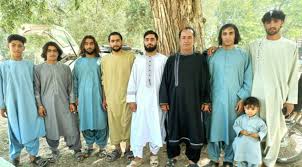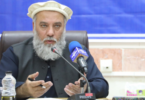HERAT (Khaama Press): Ahmad Agha, a 52-year-old resident of Rabat-e-Sangi district in Herat, the western province of Afghanistan, has 46 children. He lives with all his children under one roof, he said. Known as Ahmad Agha Nanawa (Baker), he has gained widespread fame in Rabat-e-Sangi district for having such a large family over the years.
Having this number of children has enhanced Ahmad’s reputation among the traders in this district’s market. Ahmad, who has three wives, stated: “All my children work with me. They respect and honour me. We don’t have a father-son relationship; instead, we are friends. I love them, and now I plan to marry again soon, so having four [wives].”
Meanwhile, he emphasized that his wives agreed to his subsequent marriage.
On the other hand, Parviz, one of Ahmad’s sons, adds that his father behaves like a friend to everyone, but he also wishes to have as many children as his father.
Ahmad’s neighbors also speak highly of him, considering him a good role model among those who have formed large families. Ahmad and his children are busy working in the bakery inherited from his father, providing for his family’s needs.
He emphasizes that during the recent Eid celebration, he spent significantly on purchasing clothes for his children. Ahmad says, “This Eid, I bought almost 50,000 Afghanis worth of clothes and shoes for all my children, both daughters and sons. According to him, having this many children has made him renowned among the traders and residents of this district.
In Afghan communities, social structures permit multiple marriages, reflecting cultural norms deeply rooted in tradition and religion.
Polygamy is accepted within the framework of Islamic law, which allows men to marry up to four wives under certain conditions. This practice is often influenced by economic factors, as it can signify status and wealth in some regions while also providing social support networks within extended families.
However, the acceptance of multiple marriages varies across different ethnic and socio-economic groups within Afghanistan. While some view it as a customary practice, others may challenge its legitimacy or its impact on gender equality and women’s rights. Despite these variations, the tradition of multiple marriages remains a significant aspect of Afghan social life, shaping family dynamics and community structures.







